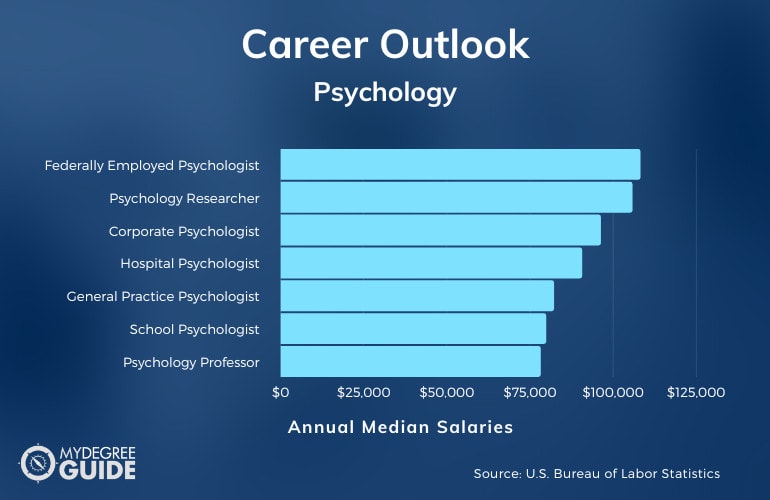Are you contemplating the career benefits of a PsyD vs. PhD?

Editorial Listing ShortCode:
Both of these often respected and fulfilling degree paths can lead to exciting things. Let’s explore the differences.
Comparing a PsyD vs. PhD in Psychology – Key Differences

You may be considering a doctorate degree in psychology because you’re simply fascinated by the human mind. You may also be confident that you can use your passion for helping people to carve out a very fulfilling career.
It’s important to be very methodical and targeted when choosing your degree path if you’re going to be working in a doctorate-level role. Let’s compare and contrast PsyD and PhD degrees.
A PsyD is considered an “alternate” degree path that puts an emphasis on the clinical and applied aspects of the field. A PsyD is likely a good fit if your goal is to work within a professional practice or counseling setting.
PsyD graduates typically work in clinical settings like psychiatry practices, rehabilitation centers, public schools, universities, or prisons. The coursework for a PsyD revolves heavily around applying things like evidenced-based research and standards of practice in real-world settings.
PsyD programs are designed to help students learn how to apply many decades of research to patient settings. Original research is not the primary goal of someone pursuing a PsyD. Yes, you will likely do independent research as part of your learning path. However, most of your focus will likely be on learning to apply your education in clinical settings.
A traditional or online PhD in psychology is often a natural fit for someone with an acute interest in the research side. This path may appeal to you if you love to break down data to discover insights. The insights that you discover through your independent research could help to move the field forward.
Many PhD holders work in research settings where they design and conduct tests and surveys to gain better understandings of things like human behavior, the effectiveness of various treatments, and underlying causes of psychological disorders.
PhD graduates are also qualified to work as instructors at colleges and universities. That means that they can apply what they’ve learned through study and research to help train the next generation of psychologists and researchers.
Many healthcare and government institutions also hire PhDs for consulting duties. The expertise that a PhD in the field of psychology can bring to the table is important for forming policies and decisions at both private and public institutions.
Ultimately, it is important to know what is a PsyD and what is a PhD in psychology before determining the best degree path for yourself.
Doctoral Psychology Careers & Salaries

What types of job roles are open to people with doctoral degrees in psychology? Roles can be filled at private practices, mental health facilities, schools, universities, and research facilities.
According to the Bureau of Labor Statistics, the median annual wage for clinical, counseling, and school psychologists is $79,820. Here’s a look at some specific annual salary expectations based on government data:
| Careers | Annual Median Salary |
| Federally Employed Psychologist | $108,180 |
| Psychology Researcher | $105,780 |
| Corporate Psychologist | $96,270 |
| Hospital Psychologist | $90,640 |
| General Practice Psychologist | $82,180 |
| School Psychologist | $79,820 |
| Psychology Professor | $78,180 |
| Marriage and Family Therapist | $51,340 |
| Exercise/Sports Psychologist | $49,170 |
| Substance Abuse, Behavioral Disorder, or Mental Health Counselor | $47,660 |
Salary expectations should be based on years of experience and the type of institution you’re employed by during your career.
PsyD vs PhD Salary Differences

It’s not an apples-to-apples comparison when it comes to salaries for these two degree paths. The setting that you choose to work in will heavily influence your salary.
PsyD
Potential for promotions and raises when moving from a general counseling role or social-work role. A private practice can often be the most lucrative option because you are earning revenue based on patient volume.
PsyD graduates can often expect generous pay when working as corporate or sports psychologists.

PhD
PhD graduates can typically command the highest salaries when leading research projects. Some PhD graduates earn six figures as tenured college professors.
Both PsyD and PhD candidates have very similar overall salary projections. However, the reality of your salary potential with either psychology degree online comes down to the type of setting you choose to work in.
Psychology Specializations & Concentrations

Most people who pursue PsyD and PhD degrees want to apply their skills to some very specific passions and interests. Here’s a look at some areas of focus for doctoral candidates:
- Clinical psychologists work one-on-one with patients to treat and diagnose mental, emotional, and behavioral disorders. They often work in practices, hospitals, and care facilities.
- Forensic psychologists apply their skills to the legal arena. They lend their expertise to things like investigations and court cases. Government agencies and local law enforcement routinely consult with forensic psychologists when working on cases or investigating crimes.
- Mental health psychologists use their highly specialized training to evaluate a person’s mental health. This is done through recognized and respected methods for interviewing, evaluating, and testing.
- Organizational psychologists provide services to organizations and businesses looking to increase productivity through psychological principles. An organizational psychologist would come into the picture to study productivity trends, management style, and employee morale to get an understanding of a company. Next, strategic recommendations are given for how to make improvements using techniques for motivation, cooperation, and productivity.
- Sports psychologists are experts at understanding how performance is impacted by both psychological and physical factors. This multifaceted specialty requires an understanding of the relationships between physiology, kinesiology, biomechanics, and psychology. Sports psychologists often work with coaches and trainers to create comprehensive plans for individual athletes and teams. They are often employed by sports teams, gyms, high schools, and universities.
A psychologist’s training and skills are tested every day on the job! The rewarding part is that all of these roles allow psychology professionals to see the impact of their work.
Psychology Licensing and Certification

Yes, you should become very familiar with the various licensing and accreditation bodies once you get deeper into your pursuit of becoming a working, licensed psychologist. It’s important to take licensing and certification seriously because your ability to legally act and speak as a psychologist depends on them!
- The American Board of Professional Psychology (ABPP) is what you might call the primary certifying body for professional psychologists in the United States. This certification shows a psychologist is credible and can be taken seriously. In addition, this certification is essentially a default requirement for being employed or representing yourself as a psychologist.
- The Association of State and Provincial Psychology Boards (ASPPB) oversees standards for the licensing and certification of all psychologists throughout both the United States and Canada. Yes, every single practicing psychologist in both countries needs to meet the association’s standards before being allowed to formally practice in their field. The ASPPB administers the Examination for Professional Practice in Psychology (EPPP).
- The Examination for Professional Practice in Psychology (EPPP) is the licensing exam developed by the ASPPB. The exam exists to certify that post-doctoral students are legally permitted to practice psychology. The ASPPB’s recommended minimum passing score is 500 out of a potential score of 800.
The bottom line is that you cannot be a practicing psychologist in the United States without having approval from the ABPP and ASPPB. Fulfilling all requirements and passing required exams are as important as graduating from a doctoral program!
It’s also worth looking into a school with regional accreditation through an organization recognized by CHEA.org.
Choosing Between a PhD in Psychology or a PsyD Degree

It’s time to get serious about making that hard choice between a PhD and PsyD. Choosing as early as possible can help you to narrow down your school search and get all of your paperwork in. Let’s look at the requirements for each program.
PhD
- A dissertation is required.
- Lower acceptance rate (approximately 15 percent).
- More funding, stipends, and support are generally provided by institutions.
- Generally requires 90 to 120 credit hours.
PsyD
- A dissertation isn’t always required.
- Higher acceptance rate (approximately 40 percent).
- No special stipends are generally given to PsyD candidates apart from standard FAFSA
- Generally requires 70 to 114 credit hours.

It can seem that a PsyD is easier to obtain at first glance. However, it’s more important to focus on which type of program is going to provide you with the preparation and training you need to be able to contribute to your chosen field of expertise.
It’s not that a PhD is more difficult to obtain. What we’re really looking at is the fact that a PhD simply requires candidates to dive into research in a more specific way than clinically minded PsyD candidates.
Yes, it does typically take less time to obtain a PsyD. This may make this degree path more attractive to you if you’re interested in getting into your field as quickly as possible.
PsyD vs PhD Admissions Requirements

The admissions requirements for PsyD and PhD candidates are similar. However, they are not interchangeable. It is typically much more difficult to be accepted into a PhD program than a PsyD program. The main reason is that PhD programs accept a fraction of the candidates.
Actual admissions requirements vary by school. However, many of the requirements are universal across all institutions. Here’s a peek at what you’ll probably need to prepare.
PsyD
- A bachelor’s degree
- Transcripts from all previous universities attended
- Letters of recommendation
- A minimum undergraduate GPA (varies by school)
- Personal essay
- GRE scores (varies by school)
PhD
- A bachelor’s degree or master’s degree in a related field
- Transcripts from all previous universities attended
- Letters of recommendation
- A minimum undergraduate GPA (typically 3.0)
- Personal essay
- GRE scores (varies by school)
What’s the Difference in PsyD vs. PhD reputation?

Both are usually highly respected. A PhD is typically viewed as a research-oriented degree.
A PsyD is typically viewed as an appropriate degree for someone with clinical aspirations.
What Jobs Can I Get With a Doctoral Degree in Psychology?
A variety of clinical and research positions are available to professionals with doctoral degrees in psychology.
The list includes psychologists, psychology researchers, school psychologists, sports psychologists, organizational psychologists, and forensic psychologists.
What is a Doctor of Psychology (PsyD)?
A PsyD is a professional doctoral degree that is designed to prepare graduates for careers in clinical settings.
Graduates often take leadership roles in institutions that diagnose and support mental health.
What is a PhD in Psychology?

A psychology PhD is a doctor of philosophy in the field of psychology.
The rigorous training and research involved in this program is designed to prepare a student to work in clinical, research, and academic settings.
Should I Continue With a Graduate Psychology Degree Program?
A graduate psychology degree program can greatly expand your career prospects. This may be a worthwhile pursuit if your goal is to become a respected expert in your field.
Getting an additional degree may enable you to go from “support” roles to leadership roles in the field of psychology.
What are the PsyD Requirements to Graduate?
You will need to complete all of the required credit hours. This typically ranges from 70 to 114 total hours. In addition, you may be required to complete a dissertation.
Most PsyD programs require an internship or practicum to provide hands-on experience.
What are the PhD in Psychology Requirements to Graduate?

It will be necessary to complete all credit hours required by your program. This may be as many as 120 credit hours for a PhD program.
You will also need to complete a dissertation related to the specialty you’re pursuing.
What are Key Differences Between a PhD and PsyD in Clinical Psychology
Choosing between a PhD and PsyD in clinical psychology comes down to a choice of research versus hands-on application.
Someone who is interested in research or academic pursuits is probably better suited for a PhD. Someone looking to practice in a clinical setting that relies on one-on-one interactions with patients is probably better suited for a PsyD.
That’s not to say that there’s no overlap. Yes, a person with a PhD can fulfill roles that require clinical expertise. Additionally, graduates of PsyD programs do sometimes end up in research roles.
Getting Your PsyD or PhD Online

Can you really dive into the human psyche on a doctoral level from home? Yes, many colleges and universities now provide doctoral programs in psychology that can be completed remotely.
Both PsyD and PhD programs usually require heavy reading and research. That means that you’ll probably be doing a lot of self-guided study as you pursue your online psych degree. This is one of the reasons why a doctorate in this field may actually be ideal for a syllabus comprised of online coursework.
An PhD or PsyD programs online can balance the self-guided nature of doctorate-level psychology studies with the expertise and guidance of trained, qualified professors in the field.
It may be necessary to complete hands-on training in a clinical setting as part of your degree requirements. This is something that colleges and universities can assist you with once you enter into a doctorate program. It’s possible that you’ll be able to complete clinical work that satisfies your degree requirement locally.
Great minds are interested in studying minds! You may be a perfect fit for an online PsyD or PhD program. Find a school that will help you make big contributions to the field of psychology to get on the perfect degree path.
